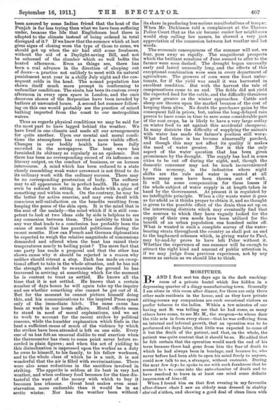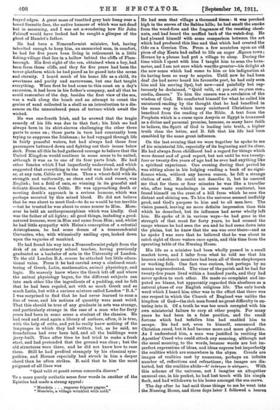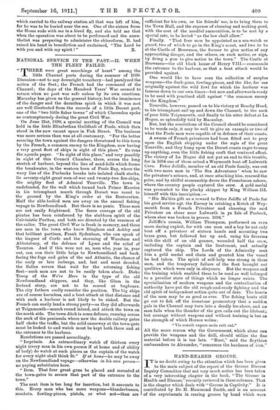MORITURUS.
BAND I first met ten days ago in the dark smoking- • room of a private hostel which lies hidden in a depressing quarter of a dingy manufacturing town. Generally I am alone in this room after dinner, for there are only three other male residents in the house, and as they have private sitting-rooms my companions are such occasional visitors as prefer tobacco to the ladies. Within a few minutes of our having met B. was telling me that he had come, as many others have come, to see Mr. M., the surgeon—to whose door the tide sets in from every shore—that he was suffering from an internal and infernal growth, that an operation was to be performed six days later, that little was expected to come of it but the death of the patient, and that, on the whole, the patient was quite content that it should be so. He added that he felt certain that the operation would mark the end of his term because there had gone from him the fear of death to which he had always been in bondage, and because be, who never before had been able to open his mind freely to anyone, could now talk to me, a stranger, without restraint. During the next few days he spoke to me with such frankness that he seemed to b: TO come into the ante-chamber of death and to have resolved to leave in at least one mind some definite impression of himself.
When I found him on that first evening in my favourite after-dinner chair I saw an elderly man dressed in shabby oler cal o'othes, and showing a good deal of clean linen with
frayed edges. A great mass of tumbled grey hair hung over a broad Socratic face, the native humour of which was not dead bat in mourning, and I was set a-wondering how Sir John Falstaff would have looked had he caught a glimpse of the ghost of Hamlet's father.
He bad been a Nonconformist minister, but, having
inherited enough to keep him, an unmarried man, in comfort, he had for five years been living in retirement in a little fishing-village that lies in a hollow behind the cliffs of Flam- borough. His first sight of the sea, obtained when a boy, had been from those cliffs, and they for five years had been the tower-platform which be had paced as he gazed into the ocean and eternity. I heard much of his home life as a child, its sweetness and purity and narrowness, but one fact taught everything. When first he had come to this coast on a day's excursion, it had been in his father's company, and all that he could remember of the day, besides the first view of the sea, was a walk along the beach and an attempt to count the grains of sand collected in a shell as an introduction to a dis- course on the unnumbered years of torture which await the wicked.
He was one-fourth Irish, and he avowed that the tragic
comedy of his life was due to that fact ; his Irish sue had always been in its shirt-sleeves challenging the other three parts to come on ; those parts in turn had constantly been trying to suppress the Irishman ; he had voyaged through life in fairly peaceful waters, but had always had those four passengers battened down and fighting out their issues below deck. From all this he had gathered courage to believe that the United Kingdom would continue in some sense to be united, although it was as to one of its four parts Irish. He had other fancies which I but imperfectly understood, and which suggested that everything in the world was Irish or English, or, at any rate, Celtic or Teuton. Thus a wheat-field with its strength and uniformity, so clean and rich and russet, was English ; but a field of oats, so winning in its graceful and delicate disorder, was Celtic. He was approaching death or meeting death's approach in a serious humour, which was perhaps secreted by this mixed blood. He did not believe that be was about to meet God—to do so would be too terrible —but he trusted he was about to come nearer to Him. More- over he held an anthropomorphism which was kindly. God was the father of all lights ; all good things, including a good- natured humour, were in Him and came from Him ; and, whilst he had little sympathy with Heine's conception of a celestial Aristophanes, he had some dream of a transcendental Cervantes, who, with whimsically smiling eyes, looked down upon the vagaries of mankind.
He had found his way into a Nonconformist pulpit from the desk of an elementary school teacher, having previously graduated as a bachelor of arts in the University of London. To the old London B.A. course he attached but little educa- tional value. From it he had carried away a confused smat- tering of Greek, Latin, mathematics, animal physiology, and logic. He scarcely knew where the Greek left off and where the animal physiology began, for the different subjects ran into each other like the ingredients of a pudding, and he felt that he had been regaled, not with so much Greek and so much Latin, but with a curious mixture called London " B.A." I was surprised to find that he had never learned to scan a line of verse, and his notions of quantity were most weird. That this should be true of any graduate in arts was strange, and particularly strange in the case of a man who for forty years bad been in some sense a student of the classics. He had read and read again a library of authors, often, it is true, with the help of cribs, and yet he really knew nothing of the languages in which they had written, but, as he said, no foundations had ever been laid, and all the buildings were jerry-built. Time after time he had tried to make a fresh start, and had pretended that the ground was clear ; but the old structures were there, and he did not know how to raze them. Still he had profited strangely by his classical sym- pathies, and Horace especially had struck in him a deeper chord than he often strikes. B. said that to him the most poignant of all lines was "Quid velit et possit serum concordia discors."
To a more purely aesthetic sense four words in another of the Epistles had made a strong appeal: "Mandela . . . rugosus frigore pages." " Mandela, a village wrinkled with cold." He had seen that village a thousand times : it was perched high in the snows of the Sabine hills; he had smelt the smoke from the wood-fires and the fragrance of the roasting chest- nuts, and had heard the muffled bark of the watch-dog. He had pleased himself with some comparison between the art which had produced this line and that which had created the Ode on a Grecian Urn. From a few scratches upon an old piece of clay Keats had called to life an eager .sEgean town; Horace by a phrase had put a village to sleep. During the time which I spent with him I taught him to scan the hexa- meter, and I am not sure which was:the greater—his delight at the new sense which had come to him or his indignation at its having been so easy to acquire. Until now he had been deaf (he had never heard his favourite poet, he had only seen him and his moving lips), but now—and painfully but rap- turously he declaimed, " Quid velit, et pos-,sit re-,rum con-, cordia, discors." To him the cwsura was a revelation of the wisdom of God. He comforted himself for what he called his untutored reading by the thought that he had benefited in the same way in which many unlettered Christians have benefited from the reading of the Bible. A text from the Prophets which is a curse upon Assyria or Egypt is treasured as a divine and personal promise, because, as many have faith to believe, the Spirit of God is leading into truth, a higher truth than the letter, and B. felt that his life had been ennobled by the same great influence.
On the last evening that we were together he spoke to me of his ministerial life, especially of its beginning and its close. He had always from childhood had a regard for things which were decent and of good report, but not until he was twenty- four or twenty-five years of age had he ever had anything like a spiritual experience. One evening during that period he was sitting alone in his lodging reading a book of no signi- ficance when, without any known reason, he felt a strange elation of soul. He could not describe it, but he assured me that for three or four minutes he was like a traveller who, after long wanderings in some waste continent, has found himself on the crest of a hill from which he sees the distant and shining sea. To him the universe seemed ineffably good, and God's purpose to him and to all men love. The vision passed, leaving no more definite impression than this which he described, but its influence bad never wholly left him. He spoke of it in various ways—be had gone in the strength of that meat for forty years, he had crossed the range whence he had seen the sea and he had come down into the plains, but he knew that the sea was over there—and as lie spoke I was sure that he believed that he was about to catch sight of those waters once again, and this time from the operating table of the Nursing Home.
His life as a minister had been wholly passed in a small market town, and I infer from what he told me that his hearers and church members had been all of them shopkeepers or working folk. One fact was curious, but perhaps by no means unprecedented. The vicar of the parish and be had for twenty-five years lived within a hundred yards, and they had never spoken to each other. He made no complaint and im- puted no blame, but apparently regarded this aloofness as a natural phase of our English religious life. The only harsh word which I heard him utter was to the effect that there was one respect in which the Church of England was unlike the kingdom of God—the rich man found no great difficulty in en- tering into it. Of a truth he was too much occupied with his own ministerial failure to carp at other people. For many years he had been in a false position, and the small fortune which bad befallen him had enabled him to escape. He bad not, even to himself, renounced the Christian creed, but it had become more and more ghostlike. As I understood him, a man was justified in reciting the Apostles' Creed who could attach any meaning, although not the usual meaning, to the words, because words are but im- perfect expressions of ideas, and ideas express but imperfectly the realities which are somewhere in the abyss. Creeds are images of realities cast by numerous, perhaps an infinite number of, reflections and refractions ; the images are dis- torted, but the realities abide—afA _a_irrpov tr aiyi'occrri. With
this scheme of the universe, not I imagine an altogether unusual one, in his pocket, he had lost touch with his simple flock, and had withdrawn to his home amongst the sea-mews.
The day after he had said these things to me be went into the Nursing Home, and three days later I followed a hearse which carried to the railway station all that was left of him, for he was to be buried near the sea. One of the sisters from the Home rode with me in a hired fly, and she told me that when the operation was about to be performed and the anaes- thetist was preparing to administer the chloroform, B. had raised his hand in benediction and exclaimed, "The Lord be












































 Previous page
Previous page